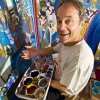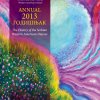1958 - born in Belgrade, Serbia
1973 - Graduated from High School
1973-1977 - Started in iconography in the group of academic painter, Professor Misa Mladenovic and under tutorship of the St. Sava Theological School in Belgrade, Serbia. Stayed with the group from 1975 to 1980.
.1980-1983 - Painted icons and frescoes with Academic Painter, Deacon Marko Ilich.
1984-1986 - Stayed in Greece learning and painting frescoes and icons in Katerini, Thesaloniki and Mount Athos. Received a blessing from master teacher of iconography, Fr. Arsenios, in the monastery in Mount Athos.
1986-1987 - Returned to Serbia and by the request and Episcopal blessing of Bishop of Sumadija, Dr. Sava, to work as an iconographer in the Serbian Orthodox Church and to paint frescoes in a monastery in Divostin and in a church in Lazarevac, Serbia.
1987-1988 - Painted frescoes in a cathedral in Kragujevac, the church in Lazarevac, and the church in Fair Oaks, CA.
1989-1990 - Painted iconostas for the church in Fair Oaks, CA, and frescoes for the churches in Serbia. Completed the iconostas in Fair Oaks, CA, and painted frescoes in the church in Serbia.
1991-1993 - Painted frescoes and icons in Serbia and 1993--continued painting frescoes in the church in Fair Oaks, CA.
1995-2008 - Began the frescos at St. Sava, Jackson, CA, and painted frescoes and icons in Libertyville, IL, South Bend and Schererville, IN, and Detroit, MI.
2008 - Completed the frescoes at St. Sava, Jackson, CA.
Text and photo from: http://www.angier-fox.com/st-sava/miloe.htm





